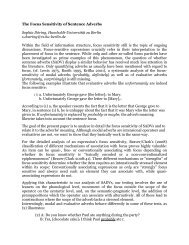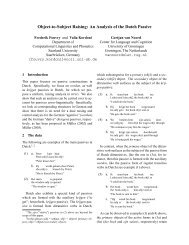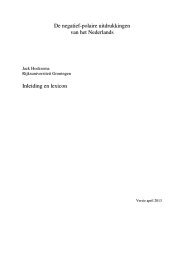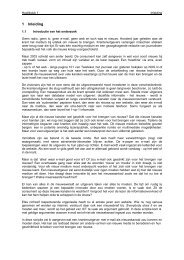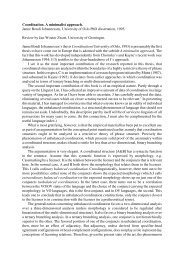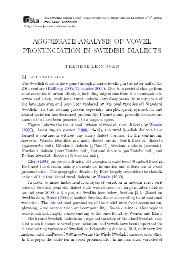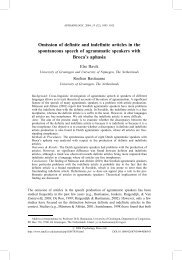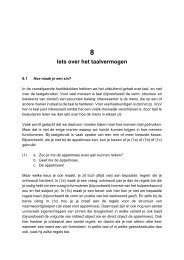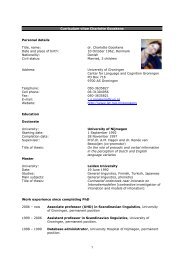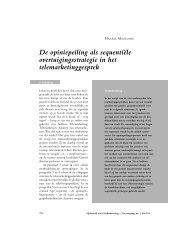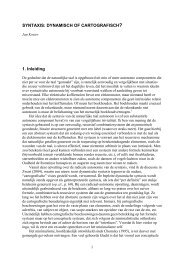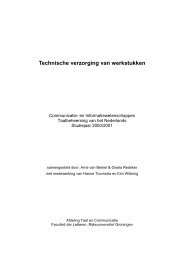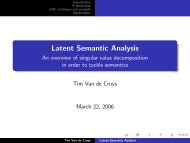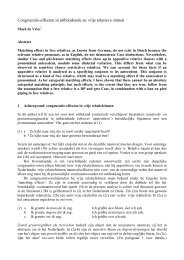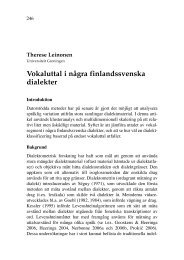Quantification in Spanish-speaking Children with Language ...
Quantification in Spanish-speaking Children with Language ...
Quantification in Spanish-speaking Children with Language ...
Create successful ePaper yourself
Turn your PDF publications into a flip-book with our unique Google optimized e-Paper software.
1. Introduction<br />
In this paper we review factors that are expected to affect the order of<br />
acquisition of quantifiers across languages. We draw a dist<strong>in</strong>ction between<br />
language-wide and language-specific factors as well as factors that relate to the<br />
biological and social profile of the learner (such as gender, socio-economic<br />
status and school<strong>in</strong>g). We then propose predictions for what cross-l<strong>in</strong>guistically<br />
similar patterns may arise. This exposition provides the theoretical background<br />
aga<strong>in</strong>st which a major empirical project has been undertaken, <strong>with</strong> the goal of<br />
document<strong>in</strong>g the extent to which the acquisition of quantifiers proceeds<br />
uniformly across languages. Here we summarize the scope of the project, the<br />
specific hypotheses under test, and other factors that must be considered <strong>in</strong><br />
analys<strong>in</strong>g the outcome of the ongo<strong>in</strong>g empirical work. We conclude by<br />
discuss<strong>in</strong>g the implications of these <strong>in</strong>vestigations for the <strong>in</strong>terface between<br />
l<strong>in</strong>guistic and non-l<strong>in</strong>guistic cognition. But first we turn to cross-l<strong>in</strong>guistic<br />
similarities <strong>in</strong> the mean<strong>in</strong>g of quantifiers <strong>in</strong> the follow<strong>in</strong>g section.<br />
2. <strong>Quantification</strong>: cross-l<strong>in</strong>guistic similarities and differences<br />
<strong>Quantification</strong>al expressions allow us to precisely express generalizations.<br />
For example, the generic ‘Dogs like to chase cats’ turns <strong>in</strong>to a much more<br />
precise claim when we change the subject to ‘some dogs’, ‘all dogs’, or ‘most<br />
dogs’. The mean<strong>in</strong>g of these quantifiers is traditionally taken to correspond to<br />
set-theoretical logical concepts (among others see Barwise & Cooper, 1981;<br />
j.ruzaite@hmf.vdu.lt. Helen Grech, University of Malta, helen.grech@um.edu.mt.<br />
Daniela Gatt, University of Malta, daniela.gatt@um.edu.mt. Arve Asbjørnsen, University<br />
of Bergen, Arve.Asbjornsen@psybp.uib.no. Janne von Koss Torkildsen, University of<br />
Bergen, Norway, janne.torkildsen@psybp.uib.no. Ewa Haman, University of Warsaw,<br />
meh@psych.uw.edu.pl. Aneta Miękisz, University of Warsaw, amiekisz@gmail.com.<br />
Natalia Gagar<strong>in</strong>a, Centre for General L<strong>in</strong>guistics, Berl<strong>in</strong>, gagar<strong>in</strong>a@zas.gwz-berl<strong>in</strong>.de.<br />
Julia Puzanova, Herzen State Pedagogical University of Russia, j.puzanova@gmail.com.<br />
Dar<strong>in</strong>ka Andjelković, University of Belgrade, dandjelk@f.bg.ac.rs. Maja Savić,<br />
University of Belgrade, smaya@eunet.rs. Smiljana Jošić, University of Belgrade,<br />
smiljana.josic@gmail.com. Daniela Slančová, Prešov University,<br />
daniela.slancova@unipo.sk. Svetlana Kapalková, Comenius University,<br />
kapalkova@fedu.uniba.sk. Tania Barberán Recalde, University of The Basque Country,<br />
tania.barberan@hotmail.com Duygu Özge, Koç University, dozge@ku.edu.tr. Saima<br />
Hassan, International Islamic University, Islamabad, cyma_h@hotmail.com. Heather van<br />
der Lely, Harvard University, hvdlely@wjh.harvard.edu. Uli Sauerland, Centre for<br />
General L<strong>in</strong>guistics, Berl<strong>in</strong>, uli@alum.mit.edu. Ira Noveck, CNRS-Université de Lyon,<br />
noveck@isc.cnrs.fr. The research reported <strong>in</strong> this paper was supported by fund<strong>in</strong>g from<br />
COST Action A33 ‘Cross-l<strong>in</strong>guistically robust stages of children’s l<strong>in</strong>guistic<br />
performance’, http://www.zas.gwz-berl<strong>in</strong>.de/<strong>in</strong>dex.php?id=47&L=1 (chair: Uli<br />
Sauerland; vice-chair: Heather van der Lely).<br />
2



